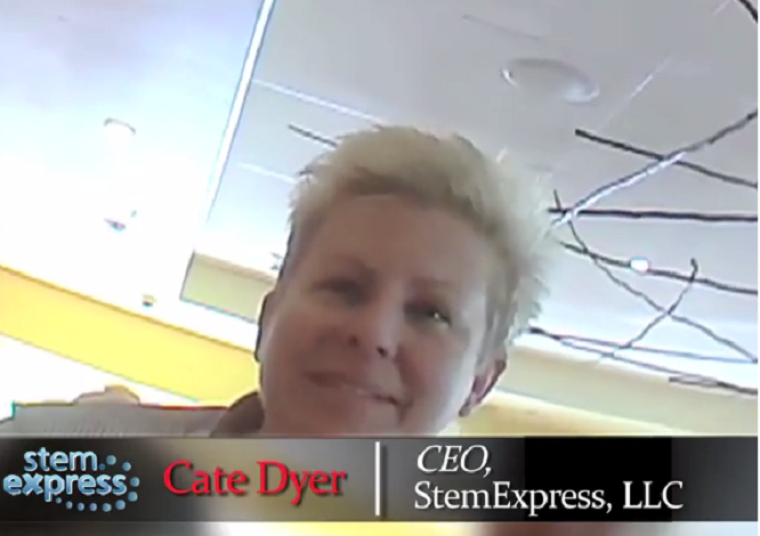StemExpress argues Planned Parenthood videos misrepresent firm's humanitarian mission

NEW YORK (Christian Examiner) – In a grizzly new video from the Center for Medical Progress, the CEO of StemExpress – the company that buys fetal organs and body parts from Planned Parenthood – claims "another 50 livers a week" would keep her happy and her supply chain moving along.
Cate Dyer, who leads the company that supposedly severed ties with Planned Parenthood earlier this month, also says in the video that her company procures many intact fetuses from the abortion provider. StemExpress is a for-profit company founded in 2010 and, according to the organization's website, it provides human tissue (fetal and adult) "to fuel regenerative medicine and translational research."
The video, the eighth distributed by CMP, comes only a few days after a Los Angeles judge ruled the anti-abortion group enjoys the same First Amendment protections as other journalistic organizations. The videos had been blocked by a restraining order.
In the video series exposing Planned Parenthood and its partners' trade in fetal tissue, actors claiming to be representatives of a "human biologics company" meet with abortion doctors and abortion clinic directors to discuss how the two groups can benefit one another. In the eighth video, the actors meet with Dyer, Kevin Cooksy, and Megan Barr. Cooksy is vice president of corporate development and legal affairs with StemExpress. Barr is the firm's procurement director.
As anyone can see and read, the entire discussion was, in fact, about 'intact livers,' which are used by StemExpress to develop and purify isolated cells used by our customers to support their critical scientific research. My use of the term 'intact cases' is a medical term or art that refers solely to 'intact livers,' as there was absolutely no mention of 'intact fetuses' at any point in over two hours of illegally recorded video.
Dyer is seen on video lamenting the fact that many physicians cannot procure "tissue," and she also hints that more fetal organs would be available if the procedures were done right – with the idea of collecting organs for sale. Changing the method of abortion to obtain fetal tissue for sale is a federal crime.
Asked by one of the actors if "intact specimens" are procured, Dyer replies affirmatively.
"Oh yeah. I mean, if you have intact cases [abortions], which we've done a lot, we sometimes ship those back to our lab in its entirety," Dyer says.
Why would they want the entire specimen shipped back to the lab? Because, according to Dyer, sometimes the dissections are performed incorrectly by less-skilled workers at abortion clinics.
"The procurement for us, I mean, it can go really sideways depending on the facility and, then, our samples are destroyed," Dyer says. "So we started bringing them back even to manage it from a procurement expert standpoint."
Dyer discusses how some clinics have shipped fetal tissue contaminated with bacteria, while others have shipped blood clots thinking they are fetal livers. She also discusses the sensitivity of fetal neural tissue and affirms the best practice for preserving it is shipping the entire calvarium or the head of the infant.
At one point, Dyer laughs about shipping intact fetal cadavers and suggesting the shipping package should carry a warning label to alert those opening it that a whole "case" – an intact baby – is inside.
"Oh, yeah. If you have intact cases, which we've done a lot, we sometimes ship those back to our lab in its entirety," Dyer says to undercover operatives from CMP posing as representatives of human biologics procurement firm.
"Tell the lab its coming," Dyer states as she laughs. "They don't want to open the box and go, 'Oh my God!'"
In spite of Dyers statement that StemExpress had "done a lot" of "intact cases," StemExperss issued a statement following the release of the video claiming it had not and accusing CMP and its founder David Daleiden of criminal activity in obtaining and releasing their "heavily edited, highly deceptive videos targeting StemExpress."
Dyer said in the statement that StemExpress "has never requested, received or provided to a researcher an 'intact fetus.' CMP's and Daleiden's continued lies reflect a sad attempt to malign StemExpress and me personally."
"As anyone can see and read, the entire discussion was, in fact, about 'intact livers,' which are used by Stem Express to develop and purify isolated cells used by our customers to support their critical scientific research. My use of the term 'intact cases' is a medical term or art that refers solely to 'intact livers,' as there was absolutely no mention of 'intact fetuses' at any point in over two hours of illegally recorded video," Dyer said in the statement.
That explanation, however, strains credibility since Dyer is seen on the video clearly acknowledging that "intact case" – as described by the buyers – refers to a full fetal cadaver.
StemExpress also claimed in its statement that it would continue to pursue legal action against CMP and Daleiden for their "illegal conduct."
It remains unclear, however, if any laws were broken by CMP. California law does prohibit the recording of private, "confidential conversations" when there is a reasonable expectation of privacy. CMP actors, however, met with the StemExpress executives at a public restaurant.
The law excludes "any other circumstance in which the parties to the communication may reasonably expect that the communication may be overheard or recorded."